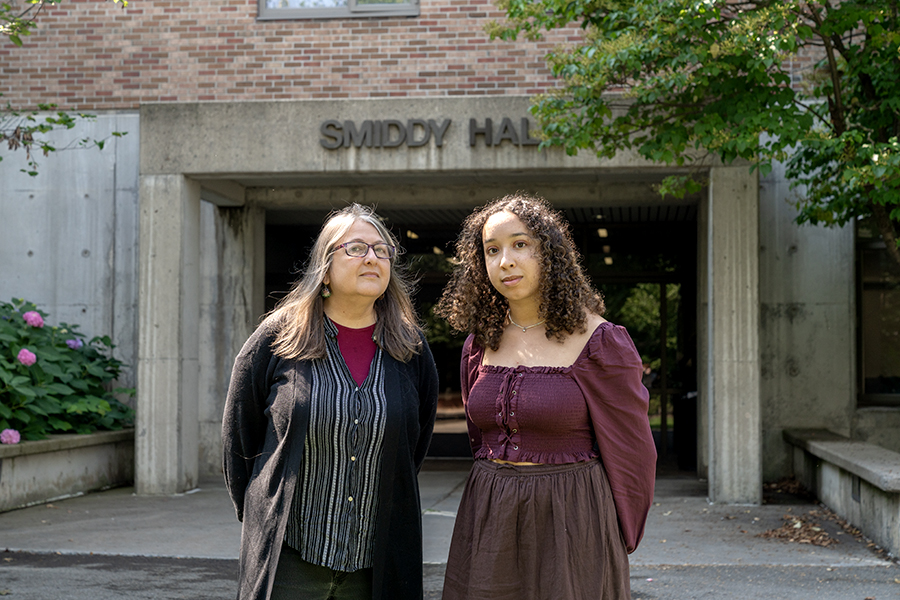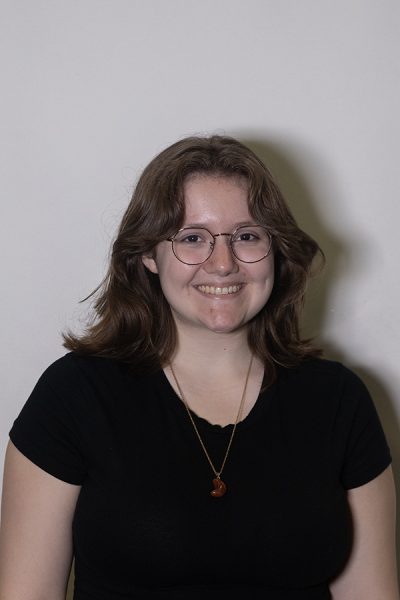As part of the Ithaca College Humanities and Sciences 2023 Summer Scholars program, senior Mikayla Tolliver, a writing major, dove into the world of young-adult fantasy novels to research representation of diversity in the genre and work on her own novel.
The Summer Scholars program provides select students with the funds to spend eight weeks working on an independent research project or a collaborative faculty-led project. These students are given the opportunity to work closely with faculty mentors to conduct their research and gain real-world experience in their chosen field.
Tolliver, who has been an avid fan of the fantasy genre from a young age, said her idea to research diversity and representation in YA fantasy novels came from her own experience as a young reader.
“It’s one of my favorite genres and growing up I wanted a little more representation,” Tolliver said.
Tolliver’s chosen faculty mentor was Joan Marcus, assistant professor in the Department of Writing, who became familiar with Tolliver’s talents after teaching her in the Writing for Children’s Literature course in Fall 2022.
“Mikayla is an incredibly strong writer,” Marcus said. “Her writing is vivid, it’s scenic. It’s incredibly thoughtful, beautifully descriptive. She has a wonderful sense of how to develop character.”
Before working on Tolliver’s manuscript, the two discussed books that could be read for research purposes, including “Skin of the Sea” by Nigerian Welsh author Natasha Bowen, and “A Song of Wraiths and Ruin” by Ghanaian American author Roseanne Brown. Tolliver explained how refreshing it was to read books with positive representation of people of color.
“The most helpful thing was reading the physical descriptions of these characters,” Tolliver said. “I think something that’s really problematic is when authors refer to people of color’s skin tones as foods and things, like the ‘caramel skin tone.’ That wasn’t happening in these books.”
Lack of diversity and representation has been a problem in the fantasy genre for a long time, which Marcus attributes to the popularity of long-lasting fantasy books and shows, like “Game of Thrones” and “Harry Potter,” that push a Eurocentric mold.
“We have a number of problematic models that often some writers like to emulate,” Marcus said. “Models derived from European myths and fairytales that can be harmful and outdated.”
Moving away from this model is an important step toward improving representation in the fantasy genre, and Tolliver’s research, which was mainly composed of internet searches and reading informational articles, was especially important for the target demographic of YA stories: young readers who, like herself, are eager to see themselves represented.
Katharyn Machan, professor in the Department of Writing, who taught Tolliver in Writing Science Fiction and Fantasy, believes this lack of representation also stems from a lack of writers of color in the fantasy space.
“People like to help folks who are like them in some way,” Machan said. “And often that can be the division when it comes to race.”
Marcus also said that because the fantasy genre has so much potential, there are many other stories to be told — they just have not yet found the voice to tell them.
“Fantasy is another world that draws from history and it’s another world that draws from culture, and we have so much history and so many cultures,” Marcus said. “It’s a matter of drawing on the multiplicity of cultures and creating something where people can truly see themselves.”
This is exactly what Tolliver aims to accomplish with her own manuscript, a YA portal fantasy novel about a young girl who ends up in her favorite fantasy book series.
“It follows dreams of escapism and also what it means to fit into a predominantly white space,” Tolliver said. “The character identifies similarly to me in terms of being biracial and growing up in very predominantly white suburbs. So, I would definitely say this character and I have a lot in common.”
Although Tolliver had been working on a version of this story since before she began attending the college, she has revised it many times throughout her college years.
“She felt as though previous versions had been very Eurocentric, which is a problem with fantasy that many writers are attempting to get away from,” Marcus said.
Through the Summer Scholars program, Tolliver was able to work on her story for an extensive amount of time, in which she finished about half of the manuscript. She believes Marcus’ mentoring played no small part in allowing her to make so much progress.
“You never really get to work one-on-one with a professor for as long as I did, where you get to send them pages every week and get to hear direct feedback,” Tolliver said. “She was super helpful. She had a lot of suggestions for me, feedback and advice.”
Tolliver’s biggest takeaway from her work with Marcus, however, was advice that addressed her writing habits rather than her work.
“She would assure me not to get too ahead of myself and to really stay in the moment and work on this project because I love what I’m doing,” Tolliver said. “And that’s the point of this. It’s to be doing something that I love and to not worry too much about the future.”
On July 27, students got to present their work and discuss their projects with attendees at the 2023 H&S Summer Scholars Showcase. Tolliver described the process as intimidating but rewarding.
“I’m like, ‘Whoa, this story that’s been inside my head for so long, I’m sharing this with other people,’” Tolliver said. “So, it was definitely weird in that way, but it also felt really good to share my project with people.”
When it comes to the future of Tolliver’s novel, publication could be on the horizon. However, she still continues to take her mentor’s advice to heart.“I would love to publish it maybe a little bit after college and I would love for it to be a book series, but once again I’m getting ahead of myself,” Tolliver said. “So I just want to focus on this story and get it published in the next few years.”





















